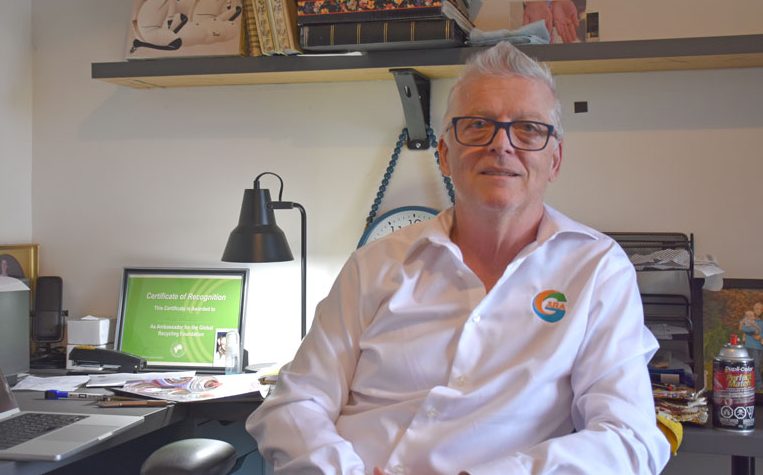FERGUS – Mike MacKay has a visual and dramatic way of showing there is still flammable gas in an empty spray can.
He lit a lighter then sprayed the can over the flame, creating a blast of fire.
“The aerosol companies hate when I do this, but it’s how I make my point,” MacKay said in an interview in his Fergus office.
“People just don’t know how bad aerosols are.”
MacKay is a hydraulic engineer by trade and was the managing director of technical sales and marketing for DeSpray Environmental, the only company in the world that manufactures the equipment to recycle aerosol cans.
But he’s now shifted gears. Instead of selling a product, he’s selling the idea that aerosol cans can and should be recycled.
That includes the hazardous gases, the lingering contents and the aluminum cans themselves.
After laying the groundwork for a couple of years, MacKay retired from DeSpray and founded the Global Aerosol Recycling Association (GARA) in 2024.
He has been making his pitch for recycling all components in aerosol cans at conventions and forums in Canada and the United States.
Only 10 per cent of aerosol cans are being recycled around the world and of that, it’s mostly the aluminum cans that are recycled.
And since even empty cans are still about 30% full on average, there’s still hazardous product and gases in those cans.
Have a wander through any hardware store and you’ll see all kinds of spray products – paint, cleaners, air fresheners, canned “air” for electronics, lubricants for cars and bikes – and then consider that 90% of what you’re looking at will eventually make its way to landfill.
Toxic gases and all.
But the gas in the cans can be captured, MacKay said, and can be converted to cooking fuel to be used in developing countries.
The aluminum can be recycled. And the traces of product still inside can also be collected and reused.
It’s expensive, however, and complicated, as the hazardous waste inside the cans differ from product to product, and therefore several recycling systems are required.
But as governments are shifting the responsibility of waste removal to producers and establishing end-of-life aerosol programs, corporations are beginning to pay attention to recycling.
“The laws are changing because the environment is getting the microscope on it,” MacKay said.
Big companies like Unilever and Proctor and Gamble are seeking him out now, MacKay said, “because they don’t know what to do.”

Mike MacKay demonstrates that there is still hazardous gas in an empty spray can by spraying it over a lit lighter. Photo by Joanne Shuttleworth
Aerosol cans can contain many different things, from barbecue fuel to hair spray to paint to deodorant. And each has different requirements for removing the gases and recycling the product.
MacKay has made inroads with Ball Cans, the biggest manufacturer of aluminum cans, and they have agreed to fund a global aluminum recycling program.
The Nigerian and Netherlands governments are working with GARA on ways to extract the gases from the cans, convert them to cooking fuel, and distribute the fuel in African countries.
GDB International, a paint recycler and founding member of GARA, will recycle the paint from spray paint in a global recycling program.
MacKay is also reaching out to hairdressers and setting up drop-off locations for empty hair spray cans.
“Public awareness is big,” MacKay said. “And the public is looking for this.
“Everybody wants to do something to benefit the environment, but how do you do anything if you don’t know what to do?
“Our focus is to go after the big guys and get them to help sponsor the programs.”
MacKay has been asked to speak at the Aerosol and Dispensing Forum (ADF) in Paris at the end of January – an invitation that makes him smile.
“I’ve been fighting aerosols all my life and they never wanted to listen to me,” he said.
“In 2019 I was cursed off the stage. So this is change.”
GARA’s mission is to transform the aerosol industry to be 100 per cent sustainable in the next 10 years.
That will take buy-in from all arms of the industry, growing the association, and securing funding for the recycling programs.
“I hope to change the propellant to a non-carbon-based fuel [in spray cans]. I hope to have recycling depots in smaller communities.
“It’s a monumental task. But the wheels are in motion, and I think the ADF will be groundbreaking,” he said.
“I really think it will take off from there.”
To learn more visit thegara.org.



